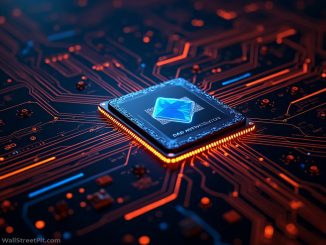- Rigetti Computing (RGTI) and IonQ (IONQ) are among nearly 20 firms selected for DARPA’s Quantum Benchmarking Initiative (QBI), launched in July 2024, to explore building a fault-tolerant quantum computer by 2033.
- QBI’s Stage A, a six-month phase, tasks these companies with proving their concepts can achieve utility-scale operation – outperforming costs – following a rigorous review by U.S. quantum experts, as noted by program manager Joe Altepeter.
- The initiative aims to drastically speed up quantum computing timelines, with Rigetti and IonQ leveraging their unique technologies to meet DARPA’s decade-long goal of delivering practical, error-free systems.

Rigetti Computing (RGTI) and IonQ (IONQ) stand among nearly 20 quantum computing firms tapped for the initial phase of DARPA’s Quantum Benchmarking Initiative (QBI), a program launched in July 2024 to push the boundaries of quantum technology. The initiative’s ambitious goal is to figure out if a fault-tolerant quantum computer – one that works reliably and delivers more value than it costs to run – can be built by 2033, far ahead of what most experts predict. These companies earned their spots in Stage A after submitting abstracts and enduring daylong presentations, convincing a panel of U.S. quantum experts that their ideas have the potential to reshape computing within a decade.
Joe Altepeter, the DARPA QBI program manager, emphasized that the selection process was rigorous, designed to weed out concepts that couldn’t hold up under scrutiny. He noted that Stage A, a six-month sprint, is where the real challenge begins—Rigetti, IonQ, and their peers must now deliver detailed technical plans proving their approaches can lead to a practical, game-changing quantum machine. The focus isn’t just on theory; QBI demands evidence that these systems can reach utility-scale operation, meaning they’d solve problems faster or cheaper than today’s best classical computers, all while keeping errors in check.
The stakes are high, as quantum computing promises to tackle complex tasks – like drug discovery or cryptography – that stump conventional systems, but only if it can overcome current limitations like error rates and high costs. Rigetti and IonQ bring distinct strengths to the table, with Rigetti known for its hybrid quantum-classical systems and IonQ advancing its trapped-ion technology, both aiming to meet DARPA’s 2033 target. This initiative isn’t about incremental progress; it’s a bold bet to accelerate a field where breakthroughs have been slow, and the next six months will test whether these companies can turn their concepts into a credible roadmap for a quantum future.
WallStreetPit does not provide investment advice. All rights reserved.
- Bulenox: Get 45% to 91% OFF ... Use Discount Code: UNO
- Risk Our Money Not Yours | Get 50% to 90% OFF ... Use Discount Code: MMBVBKSM
Disclaimer: This page contains affiliate links. If you choose to make a purchase after clicking a link, we may receive a commission at no additional cost to you. Thank you for your support!




Leave a Reply